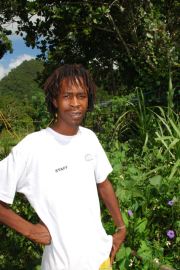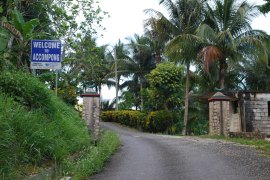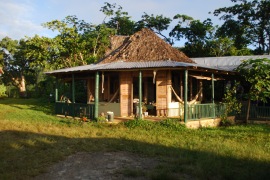Art and Science of Nature
Understanding the Beauty of the Natural WorldArchive for Accompong
Being A Maroon Descendant
Dowdie is a thirty-something Maroon; a modern young man who transcends the ancient traditions of his Maroon heritage and the encroachment of a modern world on his remote and insular community.

Dowdie, a modern Maroon. Photo: Richard L. Goldberg.
Maroons are a group of Jamaicans, direct descendants of escaped slaves that claimed the mountainous Leeward communities of the Cockpit Country as their own almost 300 years ago. Cutting themselves off from the outside world, the Maroons are self-governed and pay no taxes to the Jamaican government, an arrangement worked out in 1739-40 with the British after they lost the Maroon Wars.
Maroons are fiercely proud of their land and their heritage. When I met Dowdie this week in the Cockpit Country, one of his first questions to me in his English-like creole language was what do you think of “our” country? His question was aimed not at Jamaica, but at the town of Accompong, Nation of the Maroon descendants.

Now free to come and go; the main entrance to Accompong. Photo: Richard L. Goldberg
When entering the now permanently opened gates of Accompong, situated north of towns and villages with names like Maggoty and Retirement, the rural and pristine countryside transforms into a small, self-sufficient rural farming community. Neatly trimmed gardens of native plants and trees surround small concrete homes with tin roofs. A small provisions store at a three-way intersection near the center of town, a church and a local gathering place line steep, winding mountain roads. A quick wavy to the locals from the car while driving around the few roads in town receives an immediate likewise response.
Not more than 30 years ago, the gates to Accompong were closed to outsiders. Permission had to be granted to enter the community by The Colonel, leader of the Maroons. The Colonel still governs this peaceful society, but in recent years he has opened the Maroon community to tourism. Peace Corp projects and the Jamaican government encourage Jamaican visitors to see the “other Jamaica”, the Jamaica that few have ever seen. With all of this new-found openness, the Jamaican government still recognizes the Maroon’s sovereignty. No direct descendant of a Maroon living here pays taxes to the government.

The dining area at Baboo's Garden. Photo: Richard L. Goldberg
Dowdie works for Tony Kuhn, an American ex-patriot who built and operates “Baboo’s Garden”, an ecotourism enterprise on a Cockpit mountainside north of Accompong. Four years ago the Maroons granted Tony a 30-year lease on the land. Baboo’s Garden grew from here. His place is immersed in nature. Thatch-roof bungalows with tents inside are built into massive limestone outcrops. Tony’s vision and Dowdie’s Maroon sensibilities made Baboo’s Garden a most unique experience for guests like myself and my travel companions Alan Gettleman, a recently retired NASA employee and an orchid aficionado, and Homer Rhode, best known as the namesake of the “Homer Rhode knot”, well-used by fly fishermen.

Orthalicus undata jamaicensis, an arboreal molluscan species with a ± 2 inch shell, uncommonly found crawling on Gumbo Limbo trees at night. Photo: Richard L. Goldberg
Dowdie took an immediate interest in our like-minded pursuit of Jamaica’s terrestrial mollusks. And why not! For his entire life Dowdie has been exposed to the unique natural character of the Cockpit Country and its many endemic species of plants and animals. But he knew little about mollusks. The few larger species that are commonly found crawling on the coconut, mango and Gumbo Limbo trees were the only snails he was familiar with. The smaller, more difficult-to-find ground dwelling and limestone loving snails were new to him.
Dowdie joined us during one of our treks deep into the Cockpit Country north of Quickstep, a small village northeast of Accompong. He had never been this far into the Cockpit Country. Using his keen sense of observation Dowdie became an expert at looking for the small snails.

Tudora humphreysiana, a rare ± 15mm operculate terrestrial mollusk from the Cockpit Country of Jamaica. Photo: Richard L. Goldberg
The habitat-specific ground dwelling species found under leaf litter and those species living in fallen rain forest debris on narrow ledges of vine-entangled cliff faces of the Cockpits exposed Dowdie to yet another aspect of his natural world.
As the day wound down and the afternoon rain saturated the Cockpits with its daily soaking of life-giving moisture, Dowdie showed us a two-foot long, single stalk ground plant that he unearthed at the base of a limestone cliff. He did not recognize the plant species with its lance-shaped leaves, iridescent purple on the top and blood red underneath. With a smile and lilt in his voice he quipped, “could this be a new species?”

Dowdie's botanical find at Quickstep. Photo: Alan Gettleman
Over dinner that evening Dowdie relayed a story that seemed far removed from his idyllic crime-free world. Two weeks prior to our arrival he drove with a friend to a small town far west of Accompong. Call it a case of bad timing, but he was caught in the crossfire of a drug-related altercation and was wounded by three bullets to his torso.

The Cockpit Country, home to Jamaica's Maroons and one of the greatest concentrations of biodiversity in the world. Photo: Richard L. Goldberg
How could this have happened? And why did he not show the signs of such trauma? Dowdie was lifting and climbing as if nothing had ever happened to him. He did not complain or make light of his wounds. His take on the incident is that the Lord had a reason to spare him at that moment. If true, Dowdie was spared so that he can continue his Maroon heritage and ensure that he plays a part, hopefully great, in the survival of the natural world of the Cockpit Country.
You must be logged in to post a comment.